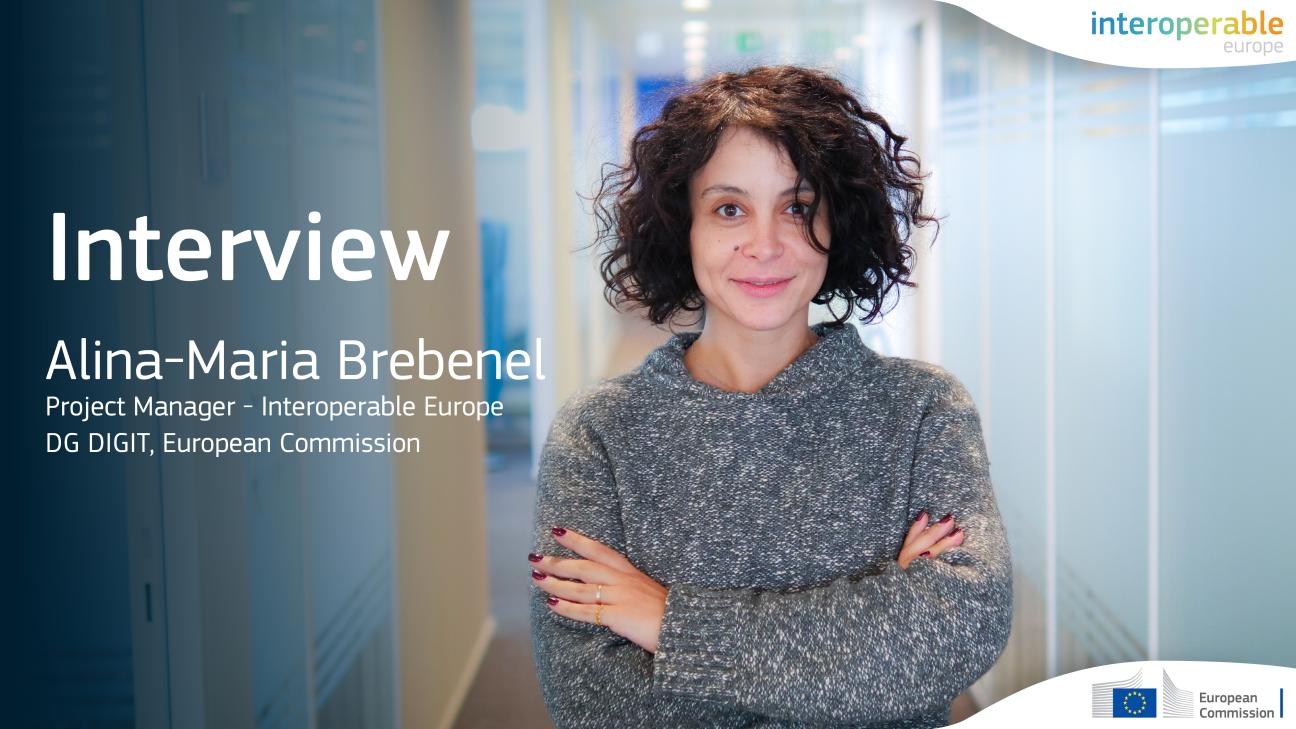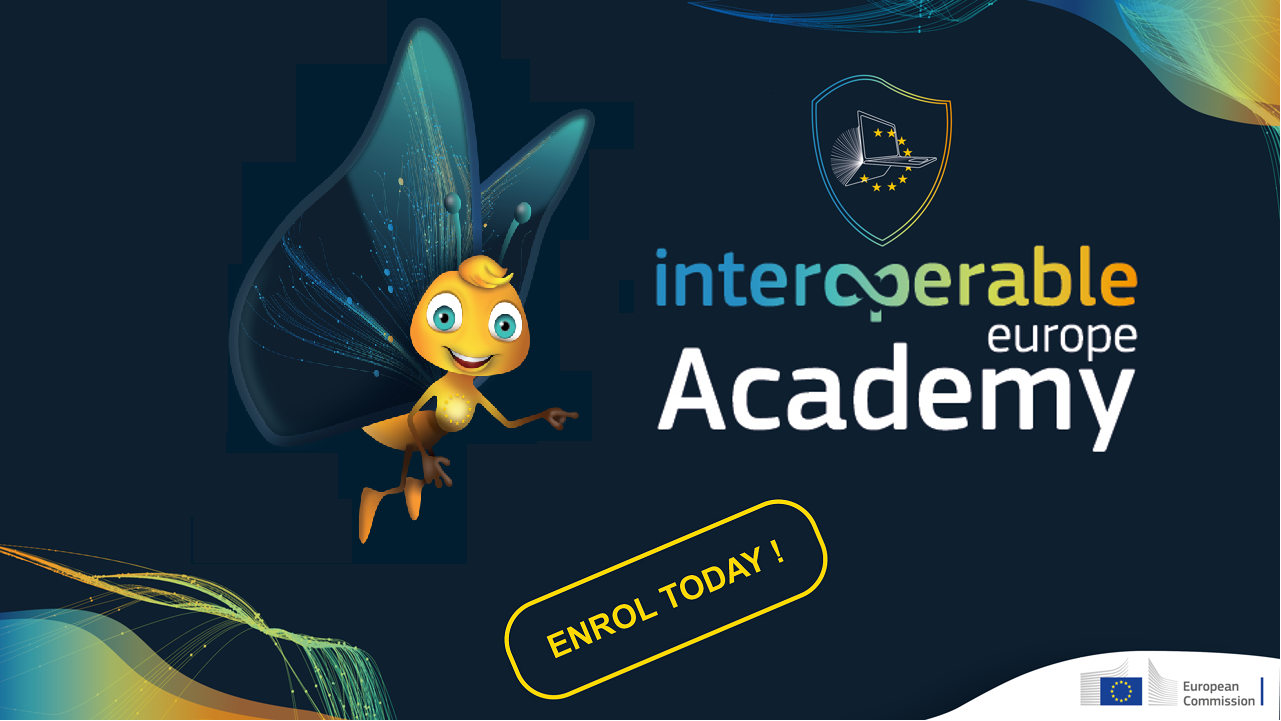Alina-Maria Brebenel: “The Interoperable Europe Academy is a learning opportunity for everyone”
more news
Alina-Maria Brebenel is a Romanian seconded national expert to the European Commission’s Directorate-General for Digital Services. As project manager, she is responsible for the day-to-day operations of the Interoperable Europe Academy.
The Academy is an online collection on the Interoperable Europe Portal for the enhancement of digital skills within public administrations across the EU. To realise this, it offers more than thirty free e-learning courses on several interoperability topics, such as semantics, architecture, and digit-ready policy making. In addition, the Academy organises webinars, workshops and other live events for the same purpose.
Alina happily states to us that she is currently living her dream job. In this interview, she opens up about her experience on being responsible for the day-to-day operational management of the Academy, the future plans for the Academy, and the role of the Academy as a safe space for collaboration.
Q: Hi Alina. Your arrival at the European Commission largely coincided with the second live event of the Interoperable Europe Academy. This event happened almost one year ago at KU Leuven and literally hundreds of people attended it. How did you experience this period?
A: I feel it was one of the most important events in my professional career. I obtained my position as a seconded national expert to the Commission on the 1st of October 2023. And in April 2024, we had the Interoperable Europe Academy event. As a result, most of the first few months at the Commission, I spent designing, discussing, and trying to put together this event, with my close colleague Bernard Claes.
I think it was an immense success. People had fun. We opened up the floor, attendees had their discussions, and they explored all sorts of ways of thinking about certain problems that hadn’t been considered before. It was extremely important for me. I am very grateful to have been a part of it. It was a true privilege to work with everybody on this event.
Q: What made the live event of the Interoperable Europe Academy such an interesting occasion in your opinion?
A: In contrast to SEMIC, which is also a very good place for experts at the operational level to discover new approaches and to share best practices, our event is more about opening up hot topics for discussion without the actual need to take or announce practical decisions. This way, through workshops and debates, the live version of our Academy introduced these hot topics in a very open manner.
In addition, the discussions took place within our threefold core audience: experts from public administrations, the students, and the academic staff. This element truly brought an extra added value to us and the public. Whenever you have this type of mingling and networking, you don't get many practical decisions, but you will have a very fruitful debate on which a lot of decision points can later rest on.
Q: Given the success, will there also be a successor to the live event?
A: We know there will be an online event for 2025. We do not know for sure the format or when it is going to happen. It will be most likely be in spring 2025, but we haven't fixed the date yet, nor do we have any particulars. However, given the fact that the Interoperable Europe Academy 2024 was a huge success, we do want to replicate it live or online every year.
Q: Historically, one of the main objectives of scientific Academies in Europe also contained this element of stimulating natural philosophers to discover new ways of thinking about certain problems. To which extent does the Interoperable Europe Academy try to pursue this vision?
A: The Interoperable Europe Academy was initiated by the Commission because it was a wish of the EU Member States to enhance knowledge in interoperability and digitalisation within its public administrations. And it remains our main goal. We primarily realise this by developing e-learning, self-paced training courses, that we host on the EU Academy platform.
However, when the Academy was founded in 2019, it was more of an ad hoc project. With time, we developed a real structured interoperability curriculum, and expanded our scope to the creation of courses that intentionally address the needs of Member States in terms of capacity and skill building.
In parallel with this evolution, an ever-growing community has been built around our initiative. The live event was also a wonderful thing in that respect. So, in addition to the Interoperable Europe Academy being a learning opportunity for everyone, my ideal for the Academy would be that it serves as a safe space for collaboration and cooperation. A place where, if you try to consider a certain policy, you can go to the Academy and you find all sorts of learning resources and extra tools. And where you can contact certain people when you have particular questions.
Q: So, in the long term, you would like to see the Academy expand its roles of building bridges and of encouraging collaboration?
A: Exactly. We are not there yet, but it is an aspiration. Even in an ideal world, you only can pursue such things incrementally. If I would have an unlimited budget, I would also like to make all our courses available in all EU languages, so we could open up these courses to everyone without exception. But an unlimited budget is not the reality.
However, regarding the goal of interaction, the implementation of the Interoperable Europe Act is a large opportunity for us. The entire Act and its interoperability ecosystem are built around this idea of cooperation and co-development as an all-encompassing approach. Wherever you look, you read in it words like co-creation, co-development, and cooperation: in the governance structure of the interoperable board, in the setting of the Interoperable Europe agenda, and even in the assessments. Thus, the element of cooperation doesn’t apply to the Academy alone.
Q: Is the Interoperable Europe Act also a top priority for the Interoperable Europe Academy in 2025?
A: Pretty much yes. I can absolutely say that there will be a very intentional way of developing courses that help national public administrators to implement the provisions of the Interoperable Europe Act, especially when these provisions require action from Member States and we would risk letting Member States face certain challenges alone without training or discussion.
The topic of interoperability assessments is a good example, among others. We are really dedicated to making our course content relevant regarding the Act, because Member States are familiar with the Academy. National public administrators have a habit of visiting the Academy to find a course on a topic they want to know more about.
"We have something exciting in the pipeline, which we call ‘peer learning policy briefs’: successful interoperability solutions that are already developed in the public administrations of EU Member States, and that could be easily implemented in other administrations."
Q: In a not-too-distant past, the Academy published courses on DCAT-AP and the Technical Support instrument, co-developed with the SEMIC Team and the Commission’s Directorate General for Structural Reform, respectively. Are there also other new or upcoming courses?
A: Certainly. We are planning to release one module on the Open Source Observatory, one module about the EIRA architecture, and we are starting production on our interoperability assessments training.
But we also have something exciting in the pipeline, which we call ‘peer learning policy brief’. It is an exercise in which we identify successful interoperability solutions that are already developed in the public administrations of EU Member States, and that could be easily implemented in other administrations. The policy briefs that we create about them will raise awareness and encourage their uptake by other public administrations. We will do this by categorising these solutions into certain domains, contextualising them, and creating roadmaps to enable other administrations to reuse them if they want to.
Q: And is it your purpose, regarding these peer learning policy briefs, to identify only those solutions that are based on the most innovative technologies?
A: Not necessarily, although we are looking at those types of solutions as well. What we're trying to find are tried and true products that help solve aspects of particular problems. For instance, we have identified a solution called “Digitale Balie”, from the municipality of Rotterdam. It enables you to request a public service and to complete it via a video call. The idea itself is not new, but it is amazing to know where you can find it, as implementing it will make your life easier. This way, the solution will help in the delivery of seamless public services.
Q: What are your precise responsibilities under the Academy?
A: Together with my colleague Bernard Claes, who is also the manager of the Interoperable Europe Portal, we make major decisions jointly, as well as long-term objectives to be pursued within a specific timeline. Other day-to-day responsibilities of mine are to make sure that the courses are developed on time and to oversee the stakeholder engagement events that we need to foresee or organise in a certain period. For the most part, I'm also in charge of planning and executing the Interoperable Europe Academy live events.
Q: What motivates you to engage yourself so deeply with the Academy, day in and day out?
A: Since its relatively recent foundation, the Academy has known significant changes. But I think what has remained constant are people behind the scenes, including myself, who have a sense of duty to make the Academy work for the public good. There is this sense that what we're doing has a real public value, and I feel it also transpires in what we do. You can look at the interviews of my predecessor, Victoria Kalogirou, and Georges Lobo, who are the founders of the Academy, and you'll see exactly the same idea. We are the embodiment of the Commission that helps Member States with acquiring skills that benefit society as a whole.
Start your discovery journey with the Interoperable Europe Academy here!

